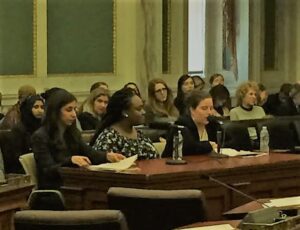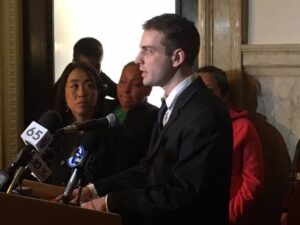This week’s Social Justice Spotlight features Kimya Forouzan, a 2L in the Social Justice Lawyering Clinic.
For many law students, witnessing the recent executive orders regarding immigration have been quite difficult. For me, it hit close to home. My parents immigrated here from Iran, one of the nations restricted by Trump’s “Muslim Ban.” While this was difficult to witness and process, these actions only reinvigorated my commitment to volunteering with immigrant communities.
Each week, I spend half of the work day volunteering with Nationalities Service Cen ter, where I coordinate and escort clients to necessary medical appointments as a part of the Refugee Health Access team. Additionally, I work as a volunteer interpreter by appointment at HIAS, interpreting for Farsi-speaking clients. Often times, this work is exhausting, both mentally and emotionally.
ter, where I coordinate and escort clients to necessary medical appointments as a part of the Refugee Health Access team. Additionally, I work as a volunteer interpreter by appointment at HIAS, interpreting for Farsi-speaking clients. Often times, this work is exhausting, both mentally and emotionally.
However, with all that is happening in the current political climate, I find it critical to make the time to contribute to social justice and do what I can to forge a path towards a healthy, safe life in the United States for those in my ethnic community.
Kimya (on right) and her sister, supporting a campaign sponsored by Franklin Fountain to raise money for Nationalities Service Center by selling homemade Persian ice cream.


 Group on Arbitrary Detention, co-wrote an Amicus Brief on behalf of psychological providers in the state litigation related to the licensing of the facility, and created educational materials to bring these practices to light. It was an honor to be a part of these efforts, working closely with seasoned practitioners and community members alike. We got to have a direct hand in advocating on behalf of some of the most vulnerable immigrants coming to the United States.
Group on Arbitrary Detention, co-wrote an Amicus Brief on behalf of psychological providers in the state litigation related to the licensing of the facility, and created educational materials to bring these practices to light. It was an honor to be a part of these efforts, working closely with seasoned practitioners and community members alike. We got to have a direct hand in advocating on behalf of some of the most vulnerable immigrants coming to the United States.